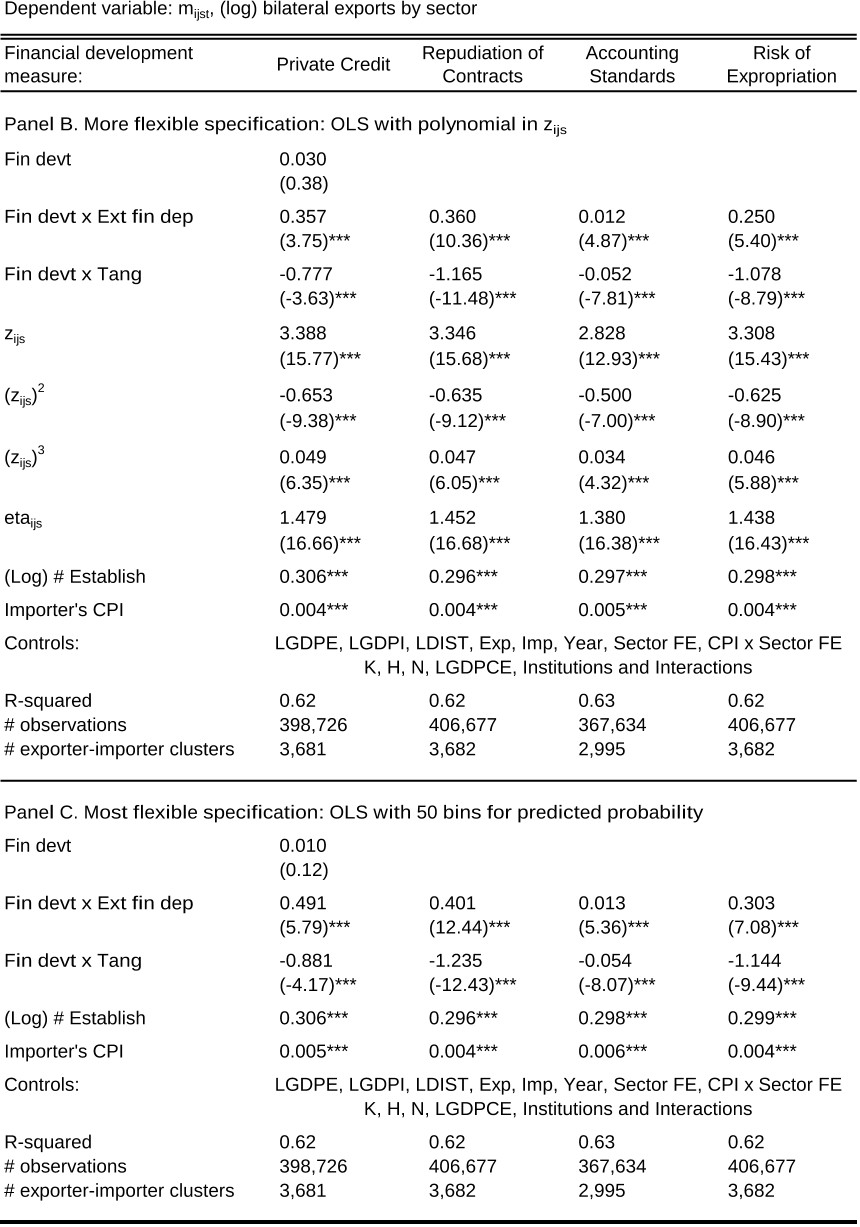Credit Constraints, Heterogeneous Firms and International Trade
Reads0
Chats0
TLDR
This article examined the detrimental consequences of financial market imperfections for international trade and developed a heterogeneous-firm model with countries at different levels of financial development and sectors of varying financial vulnerability.Abstract:
This paper examines the detrimental consequences of financial market imperfections for international trade. I develop a heterogeneous-firm model with countries at different levels of financial development and sectors of varying financial vulnerability. Applying this model to aggregate trade data, I study the mechanisms through which credit constraints operate. First, financial development increases countries' exports above and beyond its impact on overall production. Firm selection into exporting accounts for a third of the trade-specific effect, while two thirds are due to reductions in firm-level exports. Second, financially advanced economies export a wider range of products and their exports experience less product turnover. Finally, while all countries service large destinations, exporters with superior financial institutions have more trading partners and also enter smaller markets. All of these effects are magnified in financially vulnerable sectors. These results have important policy implications for less developed economies that rely on exports for economic growth but suffer from poor financial contractibility.read more
Figures

Table 10. Economic Significance: Predicted vs. Actual Trade Growth 
Table 9. Economic Significance: Comparative Statics 
Table 5. Financial Development and Firm-Level Exports 
Figure 3. The Productivity Cut-off for Exporting 
Table 5. Financial Development and Firm-Level Exports 
Table 1. Export Patterns in the Data
Citations
More filters
Posted Content
A Ricardian Theory of Production, Trade and Finance - The Role of Credit Market Imperfection
TL;DR: In this article, a Ricardian trade model for a small open economy with imperfection in the market for credit which eventually affects the pattern of production and trade is built up, where workers/entrepreneurs are endowed with different levels of capital and need to borrow to produce the credit intensive good.
Journal Article
How Local Financial Market Conditions, Interest Rates, and Productivity Relate to Decisions to Export *
TL;DR: In this paper, a heterogeneous firm model expanded to in-clude a borrowing constraint was used to study the effect of changes in interest rates on export levels in the developed and less developed financial systems.
DissertationDOI
Heterogeneity and international economics
TL;DR: In this paper, the authors explore the heterogeneity in returns to export promotion across countries using a semi-parametric varying coefficient model and evaluate the impact of terrorist attacks on economic growth while taking into account the mitigating effect of counter-terrorism through a set of strategies and policies.
Journal ArticleDOI
Destination Trade Credit and Exports: Evidence from Cross-Country Panel Data
Chang Luo,Shuai Zeng,Laixun Zhao +2 more
TL;DR: The authors examined the impact of destination trade credit (DTC) on exports, using cross-country panel data for 2000-2018 and focusing on financing by foreign trade partners, finding that DTC promotes a country's exports disproportionately more in liquidity-dependent industries, a consistent result after addressing endogeneity and various robustness tests.
Posted Content
Product Market Competition and Financial Market Screening
TL;DR: In this paper, the authors studied how the financial market and the product market are interrelated and how product market selection affects the default rate and screening incentive of financial intermediaries in a country with an underdeveloped financial market.
References
More filters
Posted Content
Law and Finance
Rafael La Porta,Rafael La Porta,Florencio Lopez de Silanes,Florencio Lopez de Silanes,Andrei Shleifer,Andrei Shleifer,Robert W. Vishny,Robert W. Vishny +7 more
TL;DR: This paper examined legal rules covering protection of corporate shareholders and creditors, the origin of these rules, and the quality of their enforcement in 49 countries and found that common law countries generally have the best, and French civil law countries the worst, legal protections of investors.
Journal ArticleDOI
Law and Finance
TL;DR: In this article, the authors examined legal rules covering protection of corporate shareholders and creditors, the origin of these rules, and the quality of their enforcement in 49 countries and found that common-law countries generally have the strongest, and French civil law countries the weakest, legal protections of investors, with German- and Scandinavian-civil law countries located in the middle.
Journal ArticleDOI
The Impact of Trade on Intra-Industry Reallocations and Aggregate Industry Productivity
TL;DR: This paper developed a dynamic industry model with heterogeneous firms to analyze the intra-industry effects of international trade and showed how the exposure to trade will induce only the more productive firms to enter the export market (while some less productive firms continue to produce only for the domestic market).
Journal ArticleDOI
Finance and Growth: Schumpeter Might Be Right
TL;DR: In this paper, the authors examined a cross-section of about 80 countries for the period 1960-89 and found that various measures of financial development are strongly associated with both current and later rates of economic growth.
ReportDOI
Financial Dependence and Growth
Raghuram G. Rajan,Raghuram G. Rajan,Raghuram G. Rajan,Luigi Zingales,Luigi Zingales,Luigi Zingales +5 more
TL;DR: This paper examined whether financial development facilitates economic growth by scrutinizing one rationale for such a relationship; that financial development reduces the costs of external finance to firms, and found that industrial sectors that are relatively more in need of foreign finance develop disproportionately faster in countries with more developed financial markets.